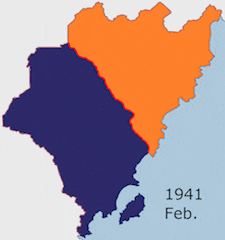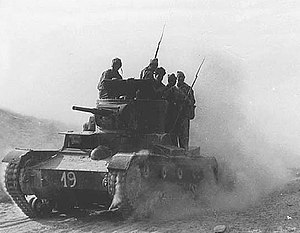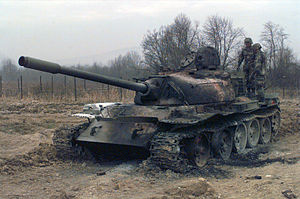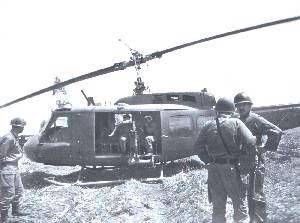User:BobOrson/Sandbox
| Vinalian Struggle | |||||||
|---|---|---|---|---|---|---|---|
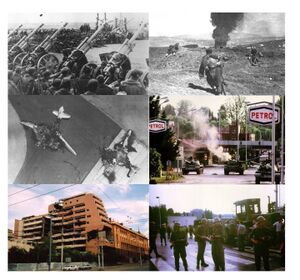 (clockwise from top left) Southern Vinalian Artillery in 1941. Northern troops advance along the Voly Na Heights in 1955. Northern tanks destroyed in the Battle of Vera 1975. Northern troops guard Nazica in 1964. Southern Ministry of Defence bombed in Velkarichka 1987. Southern planes destroyed in 1961. | |||||||
| |||||||
| Belligerents | |||||||
|
Supported by |
Supported by | ||||||
| Commanders and leaders | |||||||
|
|
| ||||||
| Strength | |||||||
|
|
| ||||||
| Casualties and losses | |||||||
| 4,500~ |
| ||||||
|
35,000–50,000 killed overall ≥3,000,000 internally displaced & ≥500,000 refugees | |||||||
The Vinalian Struggle (Narodyn:Віналія Боротьба ) is the name given to the series of conflicts between North Vinalia and South Vinalia from 1941 to 1987. Starting with the Second Vinalian Civil War in 1941, and ending with the 12 Day War in 1987. The war was marked by long periods of peace especially in the 1970's and 80's, and by short bouts of violence with the longest conflict being that of the Second Vinalian Civil War from 1941-1942.
The conflict had it's roots in the Chistovodian Civil War, and the ensuing establishment of the People's Republic of Vinalia (North Vinalia), and the Republic of Vinalia (South Vinalia), following the First Vinalian Civil War between 1933-1935 and it's inconclusive end. The Southern Invasion of the North in 1941 would spark the conflict but little would be achieved as both sides reached a peace agreement in 1942. The North would in 1955 (100 Day War) launch an offensive against the South with great success, and again in 1961 (3rd Vinalian Civil War) where the Northern Vinalian Army would achieve the greatest push against it's Southern counterpart, with peace being reached in 1962. Following the establishment of a military junta in the South, and greater radicalization from both sides would see the start of the Dirty War, as sponsored militias from both sides carried out terror attacks on the other. This would culminate in the Northern invasion in 1975 (31 Day War), with a decisive Northern defeat. In 1987 with a failing economy, and internal instability would lead to a Southern invasion in 1987 (12 Day War), where Southern forces would be decisively defeated, the Treavy of Vina would end hostilities.
The conflict showcased periods of ideological, and ethnical genocide, with acts of terrorism sponsored by both sides being carried out. Terror bombings alongside death squads were marked for their brutality specially in the South where government forces murdered 15,000 Vinakians between 1964 and 1973. Some 150,000 soldiers are estimated to have died across the variety of conflicts with some 350,000 injured, with estimates on civilian casualties ranging from 30,000 to 80,000 civilians killed, with over 300,000 injured.
Prelude
The Chistovodian Civil War had exploded in 1928, at first sec
First Vinalian Civil War (1933-1935)
With victory in Chistovodia secured the People's Army turned their attention to the south of the nation, where former Babych supporters had congregated, along with anti-socialist militias. With Chistovodian support, North Vinalian forces attempted to reconquer the south in 1933 with the Mollas Offensive, North Vinalian forces were unable to breakthrough and both nations settled into a 2 year long stalled war. Repeated Northern attempts were met with strong southern defences and by 1935 the war had grown unpopular with the Northern population, and peace was reached between both states. The south still claiming the entirety of the former Chistovodia settled for the establishment of a democratic Vinalian government, establishing the Republic of Vinalia.
Border disputes arose immediately as hundreds fled from the north to the south of the nation fearing purges, many Vinakians sought to escape to the north likewise fearing reprisals for their aiding of northern groups during the civil war. Both nations began the process of reconstruction and re armament to engage one another, with both sides acquiring surplus Great War equipment to rebuild their armies.
Second Vinalian Civil War (1941-1942)
Both Vinalia's had by the 1940's rebuilt their armies, and were ready to resume the war, the South had aggressively acquired foreign equipment , while the North relied on stocks from Swetania and Chistovodia. Yankul Kamenov President of South Vinalia had in the Congress of 1940 in November proclaimed their desire to unite Vinalia under democracy, prompting Northern forces to begin planning an invasion of the south, confident of their numerical advantage.
By January both sides were ready to cross the ceasefire line, South Vinalian forces were well aware of Northern preparations and had decided in February to launch a preemptive strike, the striked overwhelmed Northern forces and after the capture of 5,000 soldiers in the 2nd Battle of Mollas, where Southern forces were able to penetrate the Northern rear using tanks and force the Northern troops back. The Northern had by March suffered some 15,000 casualties, and was completely routed assuming defensive positions in front of the Juricia river. The Socialist world mobilized with Swetanian regulars designated as volunteers joining into the defensive line along with Chistovodian units seeking to prevent the collapse of the North. The Southern army had trouble in clearing up the pockets of left behind Northern troops and was delayed in it's advance, supply problems also crippled the Southern army as saboteurs attacked supply convoys and infrastructure to prevent further Southern push. The South would reach the Juricia river and after an attempt the 29th of March, would settle into defensive positions as it bombarded the Northern forces with heavy artillery emplacements.
Southern forces had by mid April regrouped, and attempt once more to breakthrough the Northern lines on the 15th of April. The Southern forces had met with great success as they attacked weakened and exhausted Northern forces, quickly routing them and opening a gap in the line, fearing a complete breakthrough Swetanian volunteers were rushed to the gap with fierce fighting between both sides the 16th and 17th of April. By the 18th Swetanian volunteers along with Northern reinforcements had stopped the Southern attack which had opened a large salient inside the Northern lines. Southern forces would attempt once again on the 29th to break the Swetanian forces, but concentrated artillery along with mass charges by North Vinalian soldiers would stop the Southern push, having suffered some 10,000 casualties along with 70 destroyed tanks, the South settled into a defense of the Salient.
Both sides rushed to reinforce their forces, as Northern troops prepared for an offensive against the salient, while the South geared it's forces for a push in other regions of the country. As Southern forces were mobilized away from the salient, Northern intelligence had discovered the plan, and by the 20th of May with most of the Southern artillery and tanks being mobilized eastwards the North launched it's offensive into the salient. Defended lightly by some 35,000 troops and some 50 tanks, the Northern attack caught Southern forces by surprise as some 50,000 soldiers and 80 tanks attacked the salient, the attack had been successful as Northern forces had broken through the Southern lines by the 23rd inflicting 7,000 casualties and destroying half of their tanks while only suffering some 3,000 casualties and 20 tanks. The Southern forces retreated further south setting defences on Mollas, which by the 26th had been reached by Northern forces. Both sides settled into a prolonged system of trenches surrounding Mollas either side unable to breakthrough.
Both sides would settle into a 15 month standoff in Mollas with neither side being able to break the other, under recommendation from foreign powers peace talks were held in Cuanstad, Imagua to discuss a formal end to the war, the Cuanstad agreement laid out a ceasefire agreement between both sides, with North Vinalia refusing to recognize Southern gains during the war. Following a Northern offensive from the 15-25th of September the Northern forces held a considerable advantage having encircled Norelinsk, and with the South not seeking to repeat a siege like it had in Mollas it agreed to the current frontline being marked as the border with all territory in the now Norelinsk pocket surrendered to the North the 9th of October ending the war. A Community of Nations peacekeeping mission CONVMO I, was established in the border to ensure the agreements were kept. With a demilitarized zone between both states being enforced.
100 Day War (1955)
Third Vinalian Civil War (1961-1962)
31 Day War (1975)
Following the Southern defeat in 1962 and the overthrow of the democratic government by Stefan Tretyak, South Vinalia entered into a period of economic and social stagnation as the military junta devoted all resources to the army and it's rebuilding. Many throughout the nation feared a renewed Northern offensive, as the North held considerable economic and military advantage over the South.
With tension around the inner border between both nations, Danylo Palij moved to secured
12 Day War (1987)
Vinalian Dirty War (1955-1987)
The Vinalian Dirty War refers to the actions of guerrilla groups in either North or South Vinalia, most prominently the Vinakian Liberation Front (VLF) in the South, and the Liberal Vinalian Front (LVF) and Episemialist League (EL) in the North. The VLF had been conducting a guerrilla war on the Southern government since 1933, as it aided North Vinalian forces, it's activities were expanded upon the Third Vinalian War in aid of the North and afterwards in response to the military governments reprisals on the native Vinakian population. The Liberal Vinalian Front was an Anti-Communist guerrilla group that engaged in guerrilla warfare against the Northern government, following crackdowns in the late 1960's the LVF faced severe crackdowns from the government of Danylo Palij, and aided the EL in carrying out terror attacks. The Episemialist League was a religious terror organisation started in 1967 to combat the growing religious crackdowns of the Palij government, it carried out with aid from the LVF terror attacks against North Vinalia most prominently the attacks on the Orlavo Metro.
South Vinalia
The VLF had arisen out of the banned Southern Labour Party which was primarily supported by Vinakians which could not leave their lands by government mandate, the VLF lended support and aid to the North Vinalian government, and was aided in response. By 1940 there were concerns of a Vinakian uprising in South Vinalia, which led to the establishment of martial law in the border and mountainous regions of the country. The VLF faced severe consequences following the end of the Second Civil War, with the passing of laws in 1944 which barred Vinakians from performing numerous activities such as congregating in large groups, and owning weapons. This resulted in increased VLF support, and the merging of Political parties under the VLF increased it's numbers. By 1949, the establishment of a segregated society through the Counter-Terror Laws bolstered VLF supported and by 1950 most of the Vinakian majority territory was involved in the hit and runs of the VLF.
This situation would remain until 1961, when North Vinalian forces made contact with VLF assets which aided the Northern effort, Northern supply drops into the jungle were common. During this time

